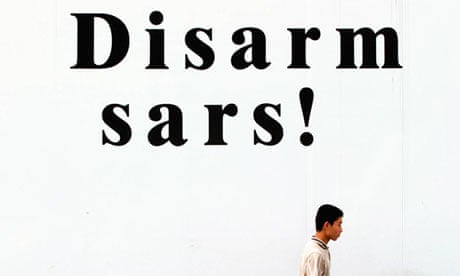Health experts are trying to identify a new Sars-like virus that is so far known to have infected two people, one of whom is receiving intensive care in a London hospital.
A 49-year-old Qatari man was transported by air ambulance from Doha almost two weeks ago. The other person, a 60-year-old man, died in Saudi Arabia, where the Qatari had recently travelled before falling ill.
The Health Protection Agency (HPA) is drawing up advice to help healthcare workers recognise in others the symptoms that occurred in the two men. These include fever, cough, shortness of breath and other breathing difficulties.
It is not clear at present whether the two confirmed cases are typical or the virus could be circulating more widely, but only rarely causing severe illness. John Watson, head of respiratory diseases at the HPA, said: "The HPA is providing advice to healthcare workers to ensure the patient under investigation is being treated appropriately.
"In the light of the severity of the illness that has been identified in the two confirmed cases, immediate steps have been taken to ensure that people who have been in contact with the UK case have not been infected, and there is no evidence to suggest they have."
Watson said information was also being prepared to help increase vigilance. This was being shared with national and international authorities including the World Health Organisation and the European Centre for Disease Control.
"As we are aware of only two cases worldwide and there is no evidence of ongoing transmission, at present there is no specific action for the public or returning travellers to take but we will share any further advice with the public as soon as more information becomes available."
The HPA said it was aware of a small number of other cases of people with a serious respiratory illness in the Middle East in the past three months, one of whom had been treated in the UK, but had since died. This person's illness was also being investigated but there was no evidence it had been caused by the same virus or that it was linked to the two confirmed cases.
The WHO said the man now in London had been admitted to intensive care in Doha, Qatar, on 7 September and flown to London on 11 September. He had also suffered renal failure. Officials will also be concerned that the hajj pilgrimage next month – which will be attended by thousands of Muslims from around the world – might provide an opportunity for the virus to spread to other countries.
The Sars crisis of 2003, which seems to have started in southern China the previous year but was not identified as a serious problem until an outbreak in Vietnam, quickly become a multicountry epidemic. There were an estimated 8,000 cases, including some in the UK, and 750 deaths.
The new virus is a type of coronavirus. These are causes of the common cold but can be responsible for far more serious illness. The new virus is different from any previously identified, the HPA says. Preliminary inquiries are said to have revealed no evidence of illness in contacts of the two cases, including healthcare workers. The agency said that based on previous knowledge of coronaviruses, many of the contacts would already have passed the period when they could have caught the virus from one of the infected people.
Peter Openshaw, director of the Centre for Respiratory Infection at Imperial College London, said: "For now, we need to be watchful: any evidence of human to human transmission causing severe disease would be very worrying and would raise the spectre of a new Sars-like outbreak.
"The hope for now is that these cases are just highly unusual presentations of a generally mild infection, and that viral surveillance and detection is now so good that we are picking up cases that would not have been found in previous times."
